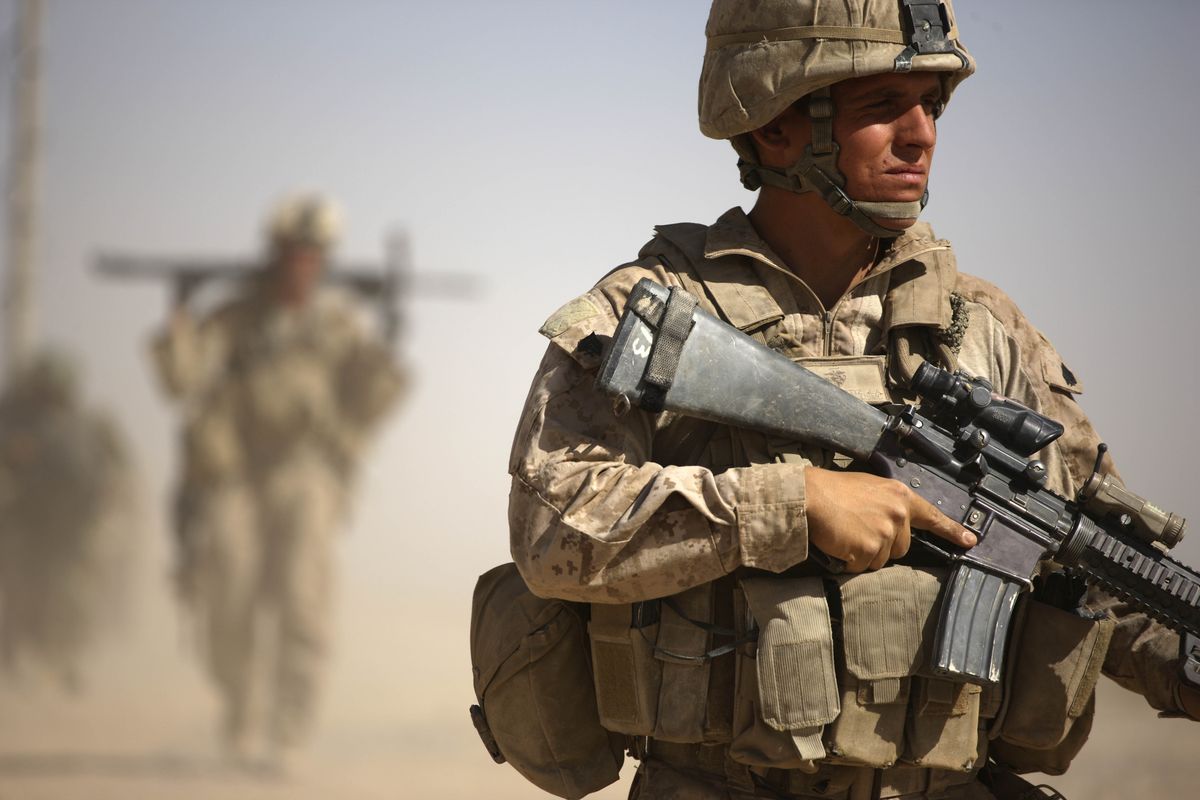Marines to be deployed to Taliban stronghold
Phased surge will allow president to alter strategy in Afghan war

KABUL – Days after President Barack Obama outlines his new war strategy in a speech Tuesday, as many as 9,000 Marines will begin deploying to southern Afghanistan to renew an assault on a Taliban stronghold that stalled earlier this year amid a troop shortage and political pressure from the Afghan government, senior U.S. officials said.
The extra Marines – the first to move into the country as part of Obama’s escalation of the eight-year-old war – will double the size of the U.S. force in the southern province of Helmand and provide a critical test for Afghan President Hamid Karzai’s struggling government and Gen. Stanley McChrystal’s counterinsurgency strategy.
“The first troops out of the door are going to be Marines,” Gen. James Conway, the Corps’ top officer, told fellow Marines in Afghanistan on Saturday. “We’ve been leaning forward in anticipation of a decision. And we’ve got some pretty stiff fighting coming.”
The Marines will quickly be followed by about 1,000 U.S. Army trainers, who will deploy as early as February to speed the growth of the Afghan National Army and police force, military officials said.
The new forces will not start moving until the president formally outlines his new strategy in a speech at the United States Military Academy at West Point. The revised plan, which faces a war-weary and increasingly skeptical American public, is expected to call for 30,000-35,000 new troops in a phased deployment over the next 12 to 18 months.
The parceling out of reinforcements is driven in part by Afghanistan’s lack of infrastructure, which is unable to support a larger U.S. force in the country immediately. The phased approach will also allow the president to cancel some of the additional reinforcements if the counterinsurgency strategy advocated by McChrystal does not show results or if the Karzai government fails to meet goals for stamping out corruption and providing for the Afghan people, White House officials said.
The first place Obama will look for results is in Helmand – a Taliban-dominated province that has been McChrystal’s primary focus for much of this year and the site of some of the bloodiest fighting. Earlier this year, about 10,000 Marines moved into the area and pushed Taliban fighters out of several major cities there. The Marines then began to rebuild the long-absent Afghan government and police forces in the area.
The U.S. offensive, however, was not able to dislodge the Taliban from places like Marjeh, a city of about 50,000 people in central Helmand that remains a major center for the opium trade. After several months of fighting, senior Marine officials concluded that they did not have enough troops to expand into Marjeh and a handful of other Taliban havens while holding onto the gains they had made in the province.
The Marines’ inability to push the Taliban out of these key sanctuaries led some Afghans in the area to doubt U.S. resolve. The Taliban have used their haven in Marjeh to produce roadside bombs and plan attacks on areas where the Marines were trying to build the local government and police forces. This month, Taliban fighters from Marjeh killed three Afghan city councilmen in the nearby city of Nawa, a place Marines had held up as a major success story in the province.
“The two questions I get from Afghans are when are you leaving and why aren’t you going into Marjeh, because that is where the real enemy is,” said Brig. Gen. Larry Nicholson, the senior Marine commander in the province.
Marine commanders have little doubt that the additional 9,000 troops moving into the province will push the Taliban out of their remaining sanctuaries in the province. But the gains will be transitory if U.S. forces do not build effective local police forces and foster a government that is relatively free of corruption and able to provide for the Afghan people, U.S. officials said. “This will be a credibility test for the (Afghan) government to see if it can deliver,” said Rear Adm. Gregory Smith, a spokesman for McChrystal.
Already, there is cause for concern. The Afghan government appears likely to commit only 60 percent of the troops that Marine and local Afghan commanders estimate that they need for the assault, a senior Marine official in Helmand said. That means more Marines will probably have to be posted in the city after the initial attack to ensure that the Taliban does not return.
“To have American Marines standing on a corner in a key village isn’t nearly as effective as having an Afghan policeman or Afghan soldier,” Conway said.
Earlier this year, Karzai intervened to halt an attack into Marjeh by U.S. Special Operations forces and Afghan troops after residents in the area complained of excessive civilian casualties, said senior military officials. The coming assault on the city will be a measure of Karzai’s willingness to buck allies with ties to the opium industry, these officials said.
The other major area of concern is whether the Afghan government and the U.S. military will be able to meet the aggressive new growth targets laid out for the Afghan army and police force in the Obama administration’s war strategy. “We have to increase recruiting. We have to increase retention, and we have to decrease attrition this year,” said Lt. Gen. William Caldwell IV, who leads the U.S. training effort in Kabul, Afghanistan’s capital.